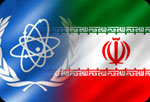 Reuters: U.N. inspectors returned on Thursday from talks in Tehran with no deal on reviving a nuclear investigation and no date for a new meeting, failing to produce even a small signal of hope for big power diplomacy aimed at averting a war. By Fredrik Dahl
Reuters: U.N. inspectors returned on Thursday from talks in Tehran with no deal on reviving a nuclear investigation and no date for a new meeting, failing to produce even a small signal of hope for big power diplomacy aimed at averting a war. By Fredrik Dahl
 VIENNA (Reuters) – U.N. inspectors returned on Thursday from talks in Tehran with no deal on reviving a nuclear investigation and no date for a new meeting, failing to produce even a small signal of hope for big power diplomacy aimed at averting a war.
VIENNA (Reuters) – U.N. inspectors returned on Thursday from talks in Tehran with no deal on reviving a nuclear investigation and no date for a new meeting, failing to produce even a small signal of hope for big power diplomacy aimed at averting a war.
“Despite its many commitments to do so, Iran has not negotiated in good faith,” said a Western diplomat accredited to the United Nations’ International Atomic Energy Agency (IAEA) in Vienna who was not at the talks. “It appears that we now have to ask ourselves if this is still the right tactic.”
The deadlock is a chilling signal for a wider effort by six world powers to get Iran to curb activity that they believe could give it the capacity to build nuclear bombs – something Israel has suggested it will prevent by force if necessary.
Further alarming its foes, Iran said this week it was installing advanced machines to refine uranium – a step that could significantly speed up its accumulation of material that the West fears could be used to develop a nuclear weapon.
A diplomatic source confirmed on Thursday that the IAEA, which regularly inspects Iranian nuclear facilities, had seen a small number of new-style centrifuges at Iran’s main enrichment plant at Natanz, positioned to be installed.
The U.N. watchdog has been trying since January last year to negotiate a framework with Iran that would let inspectors resume a long-stalled inquiry into suspected atom bomb research by the Islamic Republic.
But Wednesday’s meeting in Tehran “could not finalize the document” on the inquiry, chief U.N. inspector Herman Nackaerts told reporters on his return to Vienna.
He said no date had been set for more talks, adding: “Time is needed to reflect on the way forward.”
The United States, Russia, China, France, Britain and Germany are due to meet Iran for separate talks in Kazakhstan on February 26 to tackle a decade-old row that has already produced four rounds of U.N. sanctions against Iran.
But the Islamic Republic, which denies any military dimension to its work and is asking for acknowledgement that it is entitled to produce nuclear fuel for peaceful purposes, is heading for a presidential election in June.
CLOCK TICKING
That fact alone makes it hard for any official to be seen to make concessions to foreign powers, especially ones that suit Iran’s enemies, the United States and Israel, widely assumed to be the Middle East’s only nuclear-armed power.
“On behalf of the Iranian nation, I say that whoever thinks that the Iranian nation would surrender to pressure is making a huge mistake and will take his wish to the grave,” the outgoing president, Mahmoud Ahmadinejad, said on Thursday, according to state television.
Yet while talks go nowhere, the diplomatic clock is ticking.
Iran is expanding a stockpile of higher-grade 20-percent-enriched uranium ever closer to levels where a critical mass of weapons-grade material would be only a short step away – something that Israel says would be a “red line” for action.
Washington has also warned, in less direct terms, that it will do what it takes to prevent Iran getting the bomb. Late last year it set a March deadline for Iran to start cooperating with the IAEA’s investigation, warning Tehran that it might otherwise be referred to the U.N. Security Council.
Iran’s nuclear program was first reported to the Council by the IAEA’s 35-nation board in 2006, and Iran was then punished with U.N. sanctions, as well as stricter U.S. and European measures to strangle its vital oil exports.
Tehran says intelligence information pointing to nuclear weapons research in Iran is forged and baseless.
Some diplomats and analysts say Iran is merely using the talks with the IAEA for leverage in the separate negotiations with world powers which, unlike the IAEA, have the power to ease sanctions.
The IAEA’s immediate priority had been to visit the Parchin military base southeast of Tehran. It suspects explosives tests relevant to nuclear weapons may have taken place there, perhaps a decade ago, and then been concealed. Tehran denies the accusation.
(Additional reporting by Zahra Hosseinian; Editing by Kevin Liffey)


